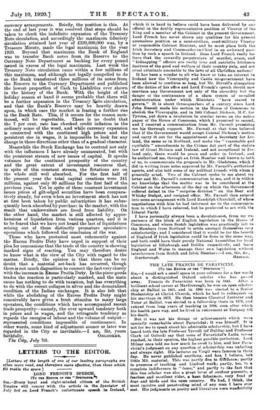LETTERS TO THE EDITOR.
[Letters of the length of one of our leading paragraphs are often more read, and therefore more effective, than those which fill treble the space.]
LORD FRENCH'S SPEECH.
(To rat EDITOIE or az " SrzerarosAl
Snt.—Every loyal and right-minded citizen of the British Empire will concur with the article in the Spectator of July 3rd on Lord Franch's unfortunate speech in Ireland, which it is hard to believe could have been delivered by any official in the doubly representative position of Viceroy of the King and a member of the Cabinet in the present Government. Lord French has never shown any qualities for his present anomalous position as a semi-civilian, semi-military Viceroy
or responsible Cabinet Minister, and he must place both the Irish Secretary and Commander-in-Chief in an awkward posi- tion by such a speech in Ireland. Does Lord French really be- lieve that the cowardly perpetrators of murder, arson, and "kidnapping" officers are really true and patriotic Irishmen desirous of the good and welfare of their country only, and not cruel criminals amenable to the laws of all Christian nations?
It has been a wonder to all who know or take an interest in Ireland how the Viceroyalty and Castle misgovernment have been allowed to continue so long, but Mr. Birrell's abnegation of the duties of his office and Lord French's speech should now convince any Government not only of the absurdity but the danger of the continuance of a sham system of so-called administration under which Ministers "have ceased to govern." It is about three-quarters of a century since Lord John Rental made his motion in the House of Commons to abolish the Viceroyalty, and in 1885 Coionel Dickson, M.P. for Tyrone, put down a resolution in similar terms on the notice paper of the House of Commons, which I promised to second, and I received a communication from Mr. Parnell promising me his thorough support. Mr. Parnell at that time believed that if the Government would accept Colonel Dickson's motion and carry it out for the appointment of a Secretary for Ire- land, the same as in Scotland, and make the "reasonable and equitable" amendments to the Crimes Act part of the statute
law of Great Britain and Ireland, and not exceptional to Ire- land only, there would be peace and order in Ireland; and he authorised me, through an Irish Member well known to both of us, to communicate the proposals to Mr. Gladstone, which I did in writing from notes approved by Mr. Parnell's authoiised agents, and also told some of my political friends with whom T generally acted. Two of the Cabinet spoke to me about mj letter and Mr. Parnell's communication to me, and it is within my knowledge that the matter was to be considered at the Cabinet on the afternoon of the day on which the Government suffered defeat in the "surprise division" on the Beer and Whisky Budget, and resigned office. Mr. Parnell then entered into some arrangement with Lord Randolph Churchill, of whose negotiations with him he had informed me in the communica- tion. to which I have referred, but he preferred to act with the Liberal Party.
I have personally always been a devolutionist, from my ex- perience of the block of English legislation in the House of Commons, and where Scotch legislation was practically left to the Members from Scotland to settle amongst themselves very satisfactorily; and I considered that it would be for the benefit of England if Irish legislation could be done in the same way, and both could have their purely National Assemblies for local legislation at Edinburgh and Dublin respectively, and leave England and Wales to manage their own legislation without interference from Scotch and Irish Members.—I am, Sir, &a.,


































 Previous page
Previous page